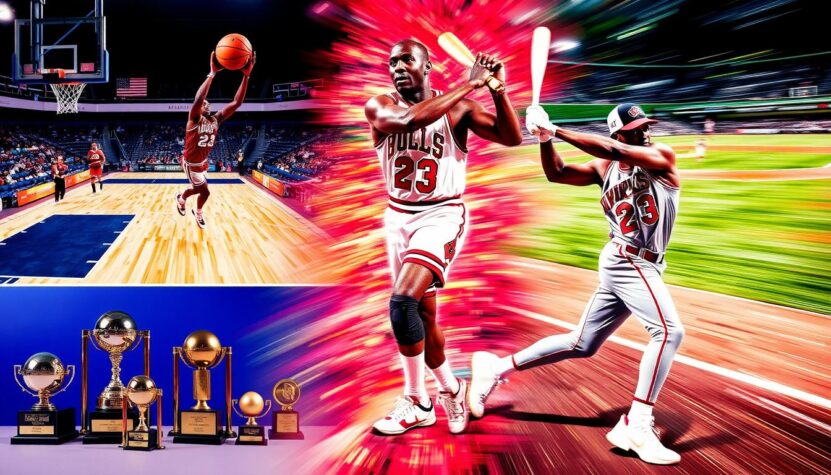Michael Jordan’s journey into baseball remains one of the most intriguing stories in the realm of sports. As a global icon renowned for his basketball prowess, you might wonder what drove him to switch sports at the apex of his NBA career. In October 1994, he announced his retirement from basketball, embarking on a quest that was deeply rooted in his family’s legacy—his father’s unwavering dream of seeing him play professional baseball. This decision led him to join the Birmingham Barons, a Double-A affiliate of the Chicago White Sox, igniting curiosity and debates about whether the legendary athlete could transition his success from basketball to baseball. As we investigate the details of Michael Jordan’s baseball career, including his statistics and performance metrics, you’ll discover the challenges and triumphs that defined this phase of his life. The legacy of this famous athlete transition is not just about numbers, but also about an unparalleled determination to embrace a new challenge in the world of MJ in sports.
Michael Jordan’s Transition from Basketball to Baseball
Michael Jordan’s leap into baseball after his NBA career marked a significant chapter in Jordan’s baseball journey. The decision stemmed from a deep personal loss and a dream he sought to fulfill. Considering the legacy of basketball legends, this transition fascinated many fans and sports analysts alike.
His Retirement from Basketball and the Drive to Play Baseball
Jordan’s unexpected retirement from basketball on October 6, 1994, was profoundly influenced by the tragic death of his father, who cherished baseball. The desire to fulfill his father’s dream propelled Jordan into the realm of baseball, a sport he had adored since childhood. Michael Jordan facts reveal that this deep motivation fueled his determination to succeed, making his return to sports resonate beyond just statistics.
Signing with the Chicago White Sox
On February 7, 1994, just ten days before turning 31, Jordan signed with the Chicago White Sox. This move represented both a tribute and a bold career switch, showcasing his audacity to pursue baseball professionally. He began his journey at the Double-A affiliate, the Birmingham Barons, where he faced the daunting task of proving himself on the diamond. His performance included a .202 batting average and three home runs, alongside 51 RBIs and 30 stolen bases. This period highlighted his adaptability, with Jordan White Sox stats illustrating significant improvements and competitiveness, traits essential for any athlete aspiring to leave an indelible mark in iconic sports moments.
Was Michael Jordan Good at Baseball? Analyzing His Performance
Evaluating Michael Jordan’s performance in the realm of baseball reveals a journey marked by determination despite challenges. Analyzing his statistics during his baseball stints, particularly with the Birmingham Barons in 1994, highlights his efforts and struggles on the field. While Jordan’s impressive athleticism was clear, translating that talent into baseball success proved difficult.
Jordan’s Statistics During His MLB Career
Across 127 games, Jordan’s hitting statistics tell a story of both promise and disappointment. He finished with a .202 batting average, tallying three home runs and 51 runs batted in (RBIs). Notably, he recorded 30 stolen bases, showcasing agility refined from his basketball career. The following table summarizes his key statistics during that season:
| Statistic | Performance |
|---|---|
| Batting Average | .202 |
| Home Runs | 3 |
| RBIs | 51 |
| Stolen Bases | 30 |
| Strikeouts | 114 |
| Fielding Errors | 11 |
Despite starting strong with an initial average of .333, Jordan faced declines as the season progressed. By late July, he struggled, seeing his batting average drop to .186 before finishing the season at .202. His slugging average was .266, and he experienced more multi-strikeout games than multi-hit games, emphasizing the adjustment challenges he faced in the minor leagues. The struggles he encountered, including subpar numbers, suggest his rise to become one of the famous baseball players was unlikely.
Skills and Adaptability on the Baseball Field
While Jordan’s statistics may not align with the expectations of a Major League Baseball career, his skills reflected the potential that came from his basketball background. His speed and athleticism shone through when he was on the base paths. Nevertheless, the lack of experience and development of baseball IQ hampered his performance significantly. Situational awareness and strategic decision-making are crucial in baseball, which were areas where Jordan fell short. His 11 errors in the outfield highlight the difficulties that come with transitioning to a sport after a lengthy absence from it.

Jordan’s venture into baseball may not have mirrored his celebrated basketball career, but his competitive spirit and refusal to give in during tough moments resonate in sports history. His story serves as a reminder of the challenges even the most famous athletes can face when stepping outside their primary sport.
For a more in-depth analysis of Jordan’s performance, you can explore a detailed breakdown of Jordan’s baseball career.
Conclusion
In reviewing Michael Jordan’s journey in Major League Baseball, you come upon a narrative that transcends mere statistics. Although he recorded a batting average of .202 and faced challenges in his debut, the broader aspects of his time with the Birmingham Barons reveal a tremendous story of perseverance. Jordan’s experience in baseball was not just about his numbers; it was about pushing boundaries and embracing a sports career switch that many might have deemed unconventional for a figure of his stature in basketball.
His commitment to improve is evident, as noted by Terry Francona, who believed that with additional at-bats, Jordan had the potential to make an impact at the major league level. This Michael Jordan trivia illustrates his relentless drive. Despite the struggles, he recorded 51 RBIs and stole 30 bases, showcasing his athletic prowess, even if his career wasn’t a standout in the MLB. These attributes highlight a competitive spirit that transcends his basketball legacy, further enriching the narrative of Jordan’s athletic career.
The excitement he brought to minor league games through his presence cannot be overlooked either. Many fans flocked to the stadium, drawn by the allure of having a global icon like Jordan in action. His experience in baseball bolstered his understanding of competition and led to a rejuvenated passion for basketball, reinforcing that even the most celebrated celebrity athletes can extend their talents beyond the court. Ultimately, Jordan’s baseball chapter adds a fascinating layer to his storied legacy, reminding you that greatness often requires venturing into unchartered waters.

